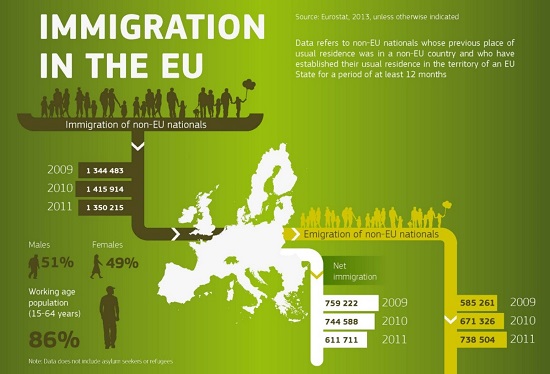Blog Post
“Give me your tired, your poor, your huddled masses”
The impact of the demographic trend on Europe is particularly concerning. The reason is that Europe’s ‘native’ workforce is ageing and the number of graduates from all levels of education is declining and will continue to decline in the coming decades.
See also policy brief ‘The global race for talent: Europe’s migration challenge‘
Europe faces two challenges. On the one hand, unemployment in some parts of Europe, namely in the southern and south-eastern member states of the European Union, has reached unprecedented levels. On the other hand, a shortage of skilled labour in a growing number of regions and industries is also apparent. At the same time, demographic forecasts clearly demonstrate that this shortage will further increase. The impact of the demographic trend on Europe is particularly concerning. The reason is that Europe’s ‘native’ workforce is ageing and the number of graduates from all levels of education is declining and will continue to decline in the coming decades.
In the short term: Facilitate EU labour mobility
The remedies to the migration challenge are obvious. In the short term, Europe needs more mobility of labour between EU member states – in particular between those with high levels of unemployment and those suffering from labour market shortages. Today, less than 1% of all economically active EU citizens move from one member state to another annually. This clearly shows that there is not yet a functioning single EU labour market.
The reasons for the absence of a single labour market are multifold. First, some European citizens who might find work in another EU member state lack the necessary linguistic competences. Others do not expect a speedy recognition of their acquired skills and therefore fear that the job offers they will receive will be below their skills level, which could lead to their de-qualification and to lower pay. Yet another reason is the fact that job seekers do not know how to start an EU-wide job search. Thirdly, there are structural barriers to mobility among the different EU member states. In some cases dealing with different social security systems is encouraging mobility, while in other cases mobility is not facilitated since social and employer benefits are not fully portable across all 28 EU member states.
Furthermore, in most EU countries various professional groups are successful at maintaining entry barriers that favour ‘insiders’. The outcome is obvious. Even if skilled EU citizens would show more interest in moving to another country, they could not easily become lawyers, teachers, civil servants, or establish a profitable business in the country of destination of their choice. Increasing home ownership also reduces the willingness and ability of EU citizens to move to another member state. This phenomenon is particularly true in crisis-hit regions and countries. The decreasing real estate prices in these areas tend to ‘lock in’ people who would otherwise be mobile.
In the long term: Facilitate high skilled migration
In the long run, even a higher degree of intra- European mobility would not be sufficient to close future gaps in European labour markets. As a result, European countries with ageing societies and stagnating or declining working age populations that lead to labour market shortages, will have to rely on immigrants. A number of EU member states accustomed to finding the kind of labour and skills they require easily, will need to think more strategically about how to attract qualified workers.
This challenge will not become easier over time. For demographic reasons in a not too distant future, many more economies – in particular China – will be in need of migrant labour. This means that the geography and composition of international migration is changing, as more countries will enter the global race for talent and skills. In the context of this emerging competition, the EU and its member states will have to develop smarter recruitment policies and improve their image as a destination for skilled migrants.
While most sending countries have adopted liberal migration policies facilitating travel and emigration, receiving countries in Europe see migration control as a key element of their sovereignty. As a result, EU member states generally have ‘unilateral’ admission policies that are neither aligned with other receiving countries nor with key sending countries. Given this situation, bilateral agreements or mobility partnerships can only play a minor role in most EU migration policymaking.
Tackling the constraints on migration
This lack of cooperation between migrant sending and receiving countries increases the costs of migration and decreases the positive effects on socio-economic development. The direct (and sometimes excessive) costs include the issuing of visas and passports, the administrative fees for recruitment and travel agencies, the commissions on currency exchange, the fees on money transfer, and other levies. These indirect costs are a form of labour market discrimination: they lead to lower incomes compared to those of native workers with similar skills; to reduced ability to transfer acquired social rights and benefits across countries, which translates into lower or no pension payments; to lower health insurance coverage; and to reduced or no access to unemployment benefits.
Smarter policies could help reduce these costs and downsides of international migration. More cooperation at all points of the migration trajectory (in sending, transit and receiving countries) would offer policymakers the opportunity to craft policies that can be mutually beneficial and help mitigate the risks of migration.
One driver of restrictive migration policies is public opinion. Many Europeans are not ready to accept more international migrants in their respective countries. In parallel, political parties with a restrictive agenda on migration are becoming more popular. In such a context, the outcome of a recent referendum in Switzerland is telling. The Swiss electorate has voted in favour of abolishing the freedom of movement between the EU and Switzerland. The objective is now to replace it by a government administered quota system. Opinion polls carried out by Maurice de Hond and Ifop seem to suggest a similar outlook: if asked in a popular referendum, citizens from a number of EU member states may have also voted in favour of restricting labour market access for workers coming from other European countries.
Unfavourable perceptions of migration create at least three challenges for the EU and its member states. First, they point to the need to organise political majorities in favour of more pro-active migration policies. Second, they emphasise the importance of making Europe more attractive for mobile people with talent and skills. Third, they encourage the move away from unilateral migration policies and toward negotiated win-win solutions aiming at reducing the costs of and enhancing the welfare gains from migration and remittances.
We should, however, keep in mind that more international migration from third countries and a greater degree of mobility between EU member states remains only one possible answer to future mismatches between the supply and the demand of labour and skills. EU member states with ageing populations must also consider other policies to protect the capabilities of their workforces. These should include increasing the retirement age and the participation of women in the labour force.
Republishing and referencing
Bruegel considers itself a public good and takes no institutional standpoint. Anyone is free to republish and/or quote this post without prior consent. Please provide a full reference, clearly stating Bruegel and the relevant author as the source, and include a prominent hyperlink to the original post.









